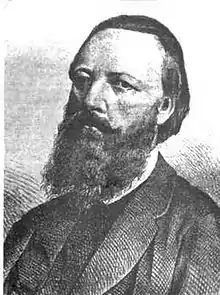Ludwik Młokosiewicz
Ludwik Franciszek Młokosiewicz (August 25, 1831 – 1909) was a Polish explorer, zoologist and botanist, who studied extensively in the Caucasus Mountains. He is one of the sons of Franciszek Młokosiewicz.

Life
Młokosiewicz was born in Warsaw, into a wealthy and aristocratic family. At the age of twenty-two he joined the Caucasian Division of the Russian Army. He used his botanical talents to plant a regimental park, orchard and water garden at Lagodekhi, on the south-eastern slopes of the Caucasus, in Georgia. In 1861 he resigned from the army and travelled south to explore the deserts of Persia. On his return he was arrested and charged with inciting revolt amongst the Poles in the Caucasus. Despite his innocence of the charges, he was sentenced to six years' enforced residence in the province of Voronezh, and his botanical collections were confiscated.
In 1876 after restrictions had been lifted Młokosiewicz explored the mountains of Dagestan, and two years later returned to Persia, travelling as far as Balochistan. On his return he was appointed Inspector of Forests for the Signakhi District, remaining at Lagodekhi for the rest of his life. He supplied foreign museums with botanical and zoological specimens.
Species that he discovered and that were named after him include the Caucasian black grouse (Tetrao mlokosiewiczi) and the golden peony (Paeonia mlokosewitschii). Beginning in 1889, Młokosiewicz urged the protection of the forested area at Lagodekhi; in 1912, three years after his death, the Russian viceregent in the Caucasus region declared what is now Lagodekhi Protected Areas.
See also
References
- Barbara and Richard Mearns, Biographies for Birdwatchers, ISBN 0-12-487422-3
- Valdis Pilāts and Māris Laiviņš, "Historical Parallels of Moricsala and Lagodekhi—Two 100-Year Old Protected Nature Areas in Latvia and Georgia", Acta Biologica Universitatis Daugavpiliensis 13.2 (2013) 111–35, ISSN 1407-8953, pp. 21–22